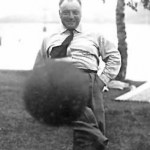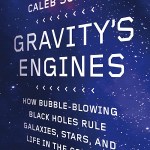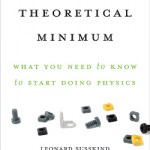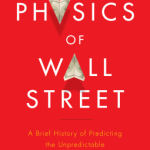Physics Books
I've got a ton of stuff that needs to get done this week, but I don't want the blog to be completely devoid of new content, so here's a quasi-poll question for my wise and worldly readers:
What scientist is most in need of a good popular biography?
By "popular biography," I mean things like Norton's Great Discoveries books, several of which Ive reviewed here, including Krauss on Feynman and Reeves on Rutherford, two books that I keep coming back to for useful tidbits. These aren't deep works of historical scholarship, and don't necessarily attempt to be definitive, but focus on being…
A little while back, I posted about the pro-theorist bias in popular physics, and Ashutosh Jogalekar offers a long and detailed response, which of course was posted on a day when I spent six hours driving to Quebec City for a conference. Sigh.
Happily, ZapperZ and Tom at Swans On Tea offer more or less the response I would've if I'd had time and Internet connectivity. Tom in particular gives a very thorough exploration of some of the reasons why experiment gets downplayed in popular physics. I particularly liked this bit:
I’m going to put forth a possibility: maybe we have a harder job, in…
Rhett at Dot Physics departed ScienceBlogs before NAtional Geographic fully took over, but still managed to connect with their book division for a physics text. This is part of a series they're doing tied in with the folks from Rovio, makers of the world's most popular smart-phone time-waster, and, as the title suggests, it uses Angry Birds as a jumping-off point to talk about physics. Rhett was, of course, an obvious choice for this, given the amount of time he's spent doing video analysis of Angry Birds to extract the underlying physics.
This is a book that can't really be reviewed just as…
Erwin Schrödinger is one of the more colorful figures in physics history. He's best known for Emmy's favorite thought experiment, of course, which attempts to demonstrate the absurdity of quantum physics through locking a cat in a box. This overshadows the Schrödinger Equation, the central equation of non-relativistic quantum mechanics, which won him a Nobel Prize in 1933. He's also renowned within physics for his unorthodox personal life, which involved innumerable extramarital affairs, and ultimately cost him a job at Oxford.
The definitive academic biography of Schrödinger has been out for…
The last week or so of silence on the blog has been due to my trip to Ohio (which was very enjoyable), and a lack of child care for the early part of this week. A day and a half home with both kids was just exhausting, but the trip was useful in that it provided me time to read Gravity's Engines by Caleb Scharf, on the plane to and from Columbus (I got the paper edition at Science Online, and figured as long as I had a printed book I wanted to read, I might as well dodge the stupid argument about whether my Nook is likely to interfere with the plane's navigation systems).
This book comes with…
Kind of short notice, but if you're in the appropriate bits of Ohio, you might be interested to know that I'm giving two talks at Wright State this Thursday. At 11am, I'm doing the Physics Department Colloquium in 202 Oelman Hall, "Talking to My Dog About Science: Why Public Communication of Science Matters, and How Social Media Can Help":
Budget cuts and funding instability are a constant source of anxiety for professional scientists, and public uncertainty about science threatens to derail critical policy actions in areas like climate change and public health. I will argue that these…
This is the physics book that's generating the most buzz just at the moment, by noted string theorist Leonard Susskind and George Hrabovsky, based on a general-audience course Susskind's been running for years. It's doing very well, with an Amazon rank in the 300's, which is kind of remarkable for a book with this many equations. Using calculus, even.
Odd though it might seem given the mathematical content, this is a book that has a lot in common with Cox and Forshaw's Why Does E=Mc2?. By which I mean that it sets out to present a very particular take on theoretical physics to a general…
As I hinted obliquely a little while back, I don't have a terribly high opinion of Wall Street or Wall Street traders. Given that, I'm not the most obvious audience for a book titled The Physics of Wall Street, and truth be told, I wouldn't've picked it up on my own. The publisher sent me an advance copy back in August, though, and I had a plane trip coming up to go play golf with some guys who work in business, so I thought it might make a decent read and possible conversation topic, and took it along.
I was very pleasantly surprised to find that it contains much more physics than Wall…
Last night, as I was flying in to San Francisco, Matt Cain pitched the first perfect game in Giants history. Now, a casual observer might think these events were unrelated, but to ancient alien theorists, the connection between them could not be more obvious. Thus, you should come to Kepler's Books in Menlo Park this evening at 7pm, to see what amazing events will happen next.
Well, OK, the most that will probably happen is that I might read a bit from the How to Teach Relativity to Your Dog in a silly voice. But you don't know that I won't use my awesome ancient alien magic to transmute lead…
Two How to Teach Relativity to Your Dog items:
First and foremost, I'll be appearing at Kepler's Books in Menlo Park, CA, this Thursday, June 14 at 7:00pm. I'll probably read a bit of the book, so if you've ever wanted to hear me do the silly dog voice live, here's your chance. Provided, of course, that you're in the San Francisco Bay Area, or will be this Thursday night.
This will be my second trip to California in as many weeks, because all last week I was at DAMOP in Anaheim (the Chain-Restaurant-est Place on Earth). I spent a fair bit of time there explaining the whole talking-to-the-dog…
In which I talk about why it is that particle physics and cosmology are so over-represented in popular physics, and why my own books contribute to that.
[The too-short excerpts on the new front page are beyond my ability to change, so I'll be doing Victorian-style "In which..." summaries at the start of posts as a work-around, so a casual visitor has some idea what a psot is about before clicking through.]
One of the maddening things about the recent upgrade of the ScienceBlogs back end has been that a lot of things have been posted during that time that I wanted to respond to. Near the top…
I was going to post something noting that the great WordPress transition will begin at 7pm tonight, and comments after that time will be lost like Roy Batty's tears. However, I have much happier news: tomorrow's Science Times (available on the Web already) will include a review of How to Teach Relativity to Your Dog!
I considered reading this book aloud to my dog, even though I doubted he would understand relativity, even as explained by the witty and clear-thinking Chad Orzel. Maxwell does seem to show some interest in Newton's first law: A body at rest tends to remain at rest, and a body in…
Some time back, I reviewed a cool book about Fermi problems by Aaron Santos, then a post-doc at Michigan. In the interim, he's taken a faculty job at Oberlin, written a second book on sports-related Fermi problems, and started a blog, none of which I had noticed until he emailed me. Shame on me.
Anyway, his new book is just out, and he's running an estimation contest with a signed copy as the prize. So, if you're the sort of person who enjoys Fermi problems, read his post then grab a convenient envelope and start estimating on the back. You have until June 1.
A few more links that have turned up of people talking about either How to Teach Physics to Your Dog and How to Teach Relativity to Your Dog:
Andrew Johnston has a review of the UK edition, praising it because "it's bang up to date, and goes beyond the basic quantum concepts into more complex areas like decoherence, entanglement and quantum teleportation," which I like to see because that's one of the things I especially wanted to do.
Natasha Zaleski, a grad student, has a review of How to Teach Relativity to Your Dog, which is good but not great, because it hit the usual failure mode: the…
I've been falling down on the shameless self-promotion front, lately, but that doesn't mean I'm not tracking How to Teach Relativity to Your Dog obsessively, just that I'm too busy to talk about it. Happily, other people have been nice enough to talk about it for me, in a variety of places:
The most significant, in terms of probable impact on sales, is this excerpt at BoingBoing, which is the text for the dog dialogue from Chapter 8. This is the same dialogue that became the "Looking for the Bacon Boson" video, and, indeed, they were nice enough to include the video in the post, too. Woo-hoo…
I'm re-instituting the quota system for the moment-- no blogging until I make some substantive progress on the current work-in-progress-- but I'll throw out a quick post here to note a media appearance: Physics World has a podcast about books on quantum physics up today:
Since its inception in the early part of the 20th century, the theory of quantum mechanics has consistently baffled many of the great physicists of our time. But while the ideas of quantum physics are challenging and notoriously weird, they seem to capture the public imagination and hold an enduring appeal. Evidence of this…
A passing mention in last week's post about impostors and underdogs got me thinking about Michael Faraday again, and I went looking for a good biography of him. The last time looked, I didn't find any in electronic form, probably because the Sony Reader store has a lousy selection. I got a Nook for Christmas, though, and this time, Alan Hirshfeld's 2006 biography, The Electric Life of Michael Faraday was right there, so I picked it up and read it over the weekend.
It was a fast read, both because this is a short popular biography-- 250-odd pages-- and because Faraday's life story makes for…
I'm trying not to be Neurotic Author Guy and obsessively check online reviews of How to Teach Relativity to Your Dog every fifteen minutes. I've actually been pretty successful at it, so successful that I didn't notice the first posted review at Amazon until my parents mentioned it to me. It's a really good one, though:
I'm at the point know where I could answer some of the most basic questions that his dog has, but I remember a time when I couldn't and when the questions the dog asks would've been exactly the questions that I would have had. Pretty much every time a statement by the author…
I had a signing yesterday at the Barnes & Noble in Vestal, NY, which drew a smallish crowd mostly of friends and family. SteelyKid came, of course, and while she spent most of her time bopping about other parts of the store, she came over to the signing area while I was signing books for people after reading a bit. They had a big stack of copies of How to Teach Relativity to Your Dog, and she started picking them up and handing them to me.
"No, honey," I said, "Those are for other people. Give them to somebody else." So she happily ran one over to my mother. And then to one of my aunts.…
The quick publicity items for this weekend:
1) I will be on the Science Fantastic radio show either Saturday or Sunday, depending on when your local affiliate runs it (or when you choose to livestream it over the Internet). The interview has already been recorded, which leaves me free for:
2) I will be signing and possibly reading from the new book at the Barnes and Noble store in Vestal, NY at 2pm on Saturday. If you're fortunate enough to live in the Southern Tier, stop by and say hi.





